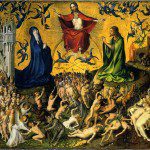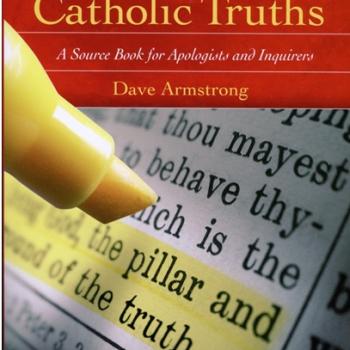Blessed John Henry Cardinal Newman, drawn by George Richmond, 1844 [public domain / Wikipedia]
***
A friend of mine complained about priests failing to actually present Catholic teachings in their homilies and the scarcity of sermons about contraception and the Real Presence and other Catholic doctrines. He thought that many homilies were feel-good pep talks that are at best marginally Catholic.
Insofar as this occurs (sometimes it is a greatly exaggerated problem, and some folks are never pleased, no matter what), it’s most unfortunate. Yet we have options to ignorance and a nominal practice of our faith. If we want to learn more, there are plenty of opportunities to do so. We can always read (or listen to, in audio files) great sermons if we’re lacking that.
I think of, for example, Blessed John Henry Cardinal Newman’s Parochial and Plain Sermons (also available online for free). That’ll keep anyone “fed” for two years. For excellent general reading (if not always homilies), check out Fr. George Rutler‘s articles.
Ideally, we should hear good, meaty homilies at Mass. But life is tough; we don’t always get what we want or should expect to get in church (though – let us never forget! – we receive Jesus Himself every week in the Holy Eucharist). I’m all for better homilies: the more the better. I love good, stirring, exhorting, convicting, inspiring ones. I’m a former evangelical Protestant; we loved our sermons and got a lot of “good” ones: as far as they (doctrinally) went.
But each individual Christian is also personally responsible under God to grow and advance beyond the baby / milk stage. They have to learn. St. Paul and the writer of the book of Hebrews referred to this:
1 Corinthians 3:1-2 (RSV) But I, brethren, could not address you as spiritual men, but as men of the flesh, as babes in Christ. [2] I fed you with milk, not solid food; for you were not ready for it; and even yet you are not ready,
Hebrews 5:12-14 For though by this time you ought to be teachers, you need some one to teach you again the first principles of God’s word. You need milk, not solid food; [13] for every one who lives on milk is unskilled in the word of righteousness, for he is a child. [14] But solid food is for the mature, for those who have their faculties trained by practice to distinguish good from evil.
If the local parish doesn’t provide good teaching, thankfully there is a lot of solid orthodox materials out there that can (including much apologetics): much of it available online for free. If we stand alone before God at the judgment, get baptized alone, confess and receive absolution alone, pray alone, do devotions alone, we can also learn theology alone if needs be.
Spiritually lazy or undereducated people need to somehow realize that they need to start learning, just like they’ll learn about any number of things in school or at their jobs. If we love our faith, we have to “get busy” and properly study it and better understand it!
The bottom-line problem is that people put a low and optional priority on learning theology and spirituality. That ultimately goes back to the individual, and can’t be blamed totally on priests lax in their duty, insofar as they deliver a mediocre homily.
This is one thing we can rectify on our own. If we want to better understand (and thus live) our faith, we can learn the theology and the spirituality and moral teachings, in any number of ways, aside from homilies.
We can’t create a reverent Mass if it isn’t available locally, or transform every priest into a St. John Chrysostom (“Golden Mouth”) or Bishop Bossuet or St. Paul, but we can do this, and there is no excuse (less now than ever, with the Internet) for anyone remaining ignorant about their faith.
It’s laziness and apathy that cause that. So sure: we may be able to (with all due respect and consideration) fault a priest who got a D in his homiletics class in seminary and who is not exactly in the league of Pericles in his oratorical and rhetorical skills. But there is also a whole lot of fault in ourselves: beams in our own eyes. We can’t change another person, but we sure can trouble ourselves to read and learn about the most important things in life: the spiritual things.


















